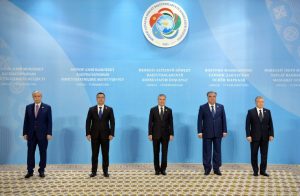As Russia’s invasion of Ukraine rages on, little attention has been paid to the potential impacts of its aggression on the strategic deliberations of policy elites in a region that Russia has traditionally considered as its backyard: Central Asia. Russia was already uncomfortable with China’s rapidly growing presence in Central Asia as well as Turkey’s — and by extension NATO’s — push for more influence amongst the Turkic nations of the region. Now Russian President Vladimir Putin’s invasion of Ukraine amounts to an own goal in the context of Russia’s future role and influence in Central Asia. Events in Ukraine have the potential to severely undermine Moscow’s influence in Central Asia and instead enable others, including China, NATO, and Turkey, to make critical commercial and strategic inroads in the region.
Strategically, and regardless of the outcome of the current war in Ukraine, regional states will be concerned with Putin’s displayed appetite for revisionism and denial of nationhood to the former members of the Soviet Union. Already, a number of regional leaders, including the Uzbek president, have hinted at the necessity of accelerating efforts at both strategic diversification and development of domestic defensive capabilities. Also significant is the fact that most of the regional actors have so far refused to lend direct support to Russia in spite of the Kremlin’s push for such an undertaking. In a sense, it could be inferred that Putin’s ill-guided adventure in Ukraine is likely to make regional states much more receptive to defense and security cooperation with other actors in the same way that the events of 9/11 and increased threat of terrorism did in the 2000s. To this end, the countries of Central Asia will be less hesitant to expand their ties with not just China and Turkey but also NATO, with which most of them already have some form of cooperative arrangement in place in the context of the alliance’s Partnership for Peace initiative.
This push for strategic diversification, secondly, would be facilitated by the expected decline in Russia’s importance as an economic or commercial partner to these states, as a direct result of Western-led sanctions. As the devaluation of the Russian ruble continues and unemployment rises, Russia will lose two key aspects of its economic influence over the regional states: a reliable labor market and a source of remittances. There can be no doubt that the Central Asian migrant workers will be among the first to be made redundant in a damaged Russian economy, while those who manage to keep their jobs will experience a sharp and painful cut in the value of their remittances — a prospect made worse at a time when budgetary shortfalls and inflationary pressures have already increased the cost of living across Central Asia.
Equally troubling is the uncertainty over the possibility of transferring money to and from Russia as major Russian banks come under sanctions and Western countries begin to exert pressure on Central Asian governments to either cut, or drastically reduce, commercial interactions with Russia-based entities. Last but not least, Russia might also be forced to adjust its budgetary priorities and hence devote fewer resources to, or even worse scrap, its financial assistance to regional countries. Such developments could cause economic difficulties for regional states in the short run but, on the plus side, it reduces Russia’s influence, which could enable them to seek diversification with greater ease or at least less concerns for Russia’s reaction.
If Russia fails to coerce Ukraine into defeat, lastly, the convergence of its expected diminished economic influence and increased regional appetite for strategic diversification could lead to calls for the establishment of new region-wide defense and security arrangements. Moscow’s failure in Ukraine could embolden regional actors to openly question the utility and viability of Russian-led military-political organizations in Central Asia like the Collective Security Treaty Organization (CSTO) and Eurasian Economic Union (EAEU) and instead seek alternative arrangements with other actors or demand an overhaul of the existing ones. Put another way: Some regional states might try to take advantage of Russian’s weakness and isolation in order to either exit Russia-led arrangements or call for new arrangements that place them on a more equal footing with Moscow. Such an eventuality, in turn, can only a be strategic boon for, among others, China and Turkey at the direct expense of Russia.
Therefore, and in an ironic turn of events, Putin’s push for restoring Moscow’s past glories could very well bring about its further demise: not just in Europe but also in Central Asia.

































